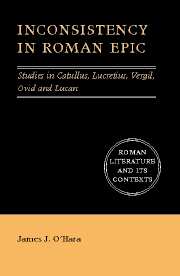Book contents
- Frontmatter
- Contents
- Acknowledgments
- Introduction
- 1 Greek versions
- 2 Catullus 64: Variants and the virtues of heroes
- 3 Death, inconsistency, and the Epicurean poet
- 4 Voices, variants, and inconsistency in the Aeneid
- 5 Inconsistency and authority in Ovid's Metamorphoses
- 6 Postscript: Lucan's Bellum Civile and the inconsistent Roman epic
- Bibliography
- Index of passages discussed
- General index
6 - Postscript: Lucan's Bellum Civile and the inconsistent Roman epic
Published online by Cambridge University Press: 12 January 2010
- Frontmatter
- Contents
- Acknowledgments
- Introduction
- 1 Greek versions
- 2 Catullus 64: Variants and the virtues of heroes
- 3 Death, inconsistency, and the Epicurean poet
- 4 Voices, variants, and inconsistency in the Aeneid
- 5 Inconsistency and authority in Ovid's Metamorphoses
- 6 Postscript: Lucan's Bellum Civile and the inconsistent Roman epic
- Bibliography
- Index of passages discussed
- General index
Summary
Thirty-five years ago Froma Zeitlin's study of Petronius' Satyricon argued that “Petronius sees the world as irrational, confused, and illusory,” and that the incongruities of his novel are “integral emblems of a world-view that expresses a consistent vision of disintegration.” When she wanted to find another ancient author to whom her Petronius could be compared, Zeitlin had to reach back five centuries to name Euripides and his “chaotic contemporary world.” Today, and especially I hope after the last five chapters, we can see that changes in the way that scholars approach Greek and especially Latin poetry have meant that it is not so hard to find authors who see the world as “irrational, confused, and illusory.” Within Petronius' own period, of course, such a description fits many scholars' view of the Neronian poet Lucan, especially among those who have stressed the “fractured” or disunified aspects of the Bellum Civile.
What these pages will briefly suggest is that Lucan's epic has much in common not only with Petronius' novel, but also with the work of the Roman epic poets who preceded him, and so the question of whether and to what purpose Lucan might be “fractured” or disunified must be approached in the context of their practice.
- Type
- Chapter
- Information
- Inconsistency in Roman EpicStudies in Catullus, Lucretius, Vergil, Ovid and Lucan, pp. 131 - 142Publisher: Cambridge University PressPrint publication year: 2007



